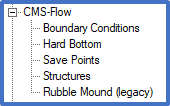CMS-Flow/Culverts: Difference between revisions
Created page with "{{DISPLAYTITLE:CMS-Flow Culverts (DRAFT)}} = Introduction = Culverts are a common coastal engineering structure typically used in coastal wetlands to control waste and storm water discharges, act as salinity barriers, optimally distribute freshwater, and manage sediment transport (Figure 1). In coastal applications, the culverts often connect open water bodies of similar water surface elevation to enhance flushing or conduct flow through levees or causeways. Since culve..." |
|||
| Line 13: | Line 13: | ||
* Culvert feature arcs are direction specific and should begin on the Bayside of the culvert and end with the Seaside location. | * Culvert feature arcs are direction specific and should begin on the Bayside of the culvert and end with the Seaside location. | ||
Values needed by the CMS for each Culvert are listed in the table below. If there is a user-definable option in the dialog for the user to enter a value, the word 'Dialog' is shown in column 2, otherwise | Values needed by the CMS for each Culvert are listed in the table below. If there is a user-definable option in the dialog for the user to enter a value, the word 'Dialog' is shown in column 2, otherwise the words 'No dialog' are written in column 2. | ||
{| class="wikitable sortable" | {| class="wikitable sortable" | ||
| Line 44: | Line 44: | ||
| Outflow angle for seaside and bayside|| No dialog | | Outflow angle for seaside and bayside|| No dialog | ||
|} | |} | ||
SMS will handle the assignment of the appropriate values for Cell IDs, Length, Invert Elevations, and Outflow Angles. | |||
* The "Structures" coverage will need to be applied to the CMS Simulation in order to export the appropriate cards to the parameter file. | * The "Structures" coverage will need to be applied to the CMS Simulation in order to export the appropriate cards to the parameter file. | ||
Revision as of 16:36, 25 September 2024
Introduction
Culverts are a common coastal engineering structure typically used in coastal wetlands to control waste and storm water discharges, act as salinity barriers, optimally distribute freshwater, and manage sediment transport (Figure 1). In coastal applications, the culverts often connect open water bodies of similar water surface elevation to enhance flushing or conduct flow through levees or causeways. Since culverts are a significant component of hydrodynamic and sediment transport controls in the coastal zone, it is important that the CMS simulates their effects. The implementation of culverts in the CMS is based on equations developed by Bodhaine (1982).
Usage of Culverts for CMS in the SMS
Early SMS versions (< 13.4)
Previous documentation (Link given below) described the formulation and implementation of Culverts in CMS, detailing input requirements for SMS versions up to 11.2. This implementation required hand-manipulation of the CMS-Flow parameter files to add in lists of cells and option values.
Future SMS versions (13.4.x)

A new "Structures" coverage has been added beneath the CMS-Flow model option in SMS 13.4 and later. This one coverage will handle Culverts as well as three other types: Rubble Mounds, Weirs, and Tide Gates.
- Culverts are added to this coverage with the placement of Feature Arcs.
- Culvert feature arcs are direction specific and should begin on the Bayside of the culvert and end with the Seaside location.
Values needed by the CMS for each Culvert are listed in the table below. If there is a user-definable option in the dialog for the user to enter a value, the word 'Dialog' is shown in column 2, otherwise the words 'No dialog' are written in column 2.
| Cell IDs (2 values) | No dialog |
| Type of Culvert (Circular or Box) | Dialog |
| Existence of Flap Gate (On or Off) | Dialog |
| Radius (if Circular is selected above) | Dialog |
| Width (if Box is selected above) | Dialog |
| Height (if Box is selected above) | Dialog |
| Length | No dialog |
| Darcy-Weisbach friction coefficient | Dialog |
| Manning friction coefficient | Dialog |
| Invert Elevations | No dialog |
| Bayside entrance and exit head loss (2 values) | Dialog |
| Seaside entrance and exit head loss (2 values) | Dialog |
| Outflow angle for seaside and bayside | No dialog |
SMS will handle the assignment of the appropriate values for Cell IDs, Length, Invert Elevations, and Outflow Angles.
- The "Structures" coverage will need to be applied to the CMS Simulation in order to export the appropriate cards to the parameter file.
Documentation
Last update 9/25/2024
Back to CMS-Flow Structures page
Back to Documentation Portal